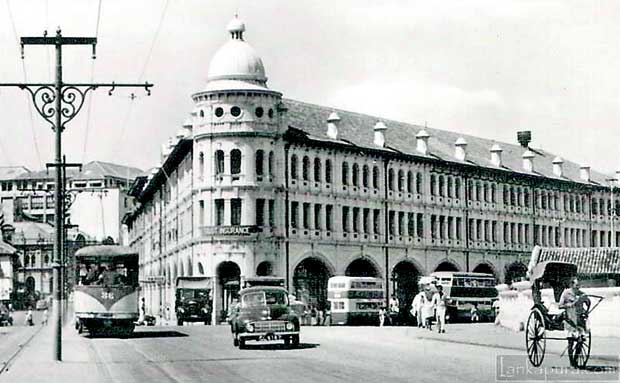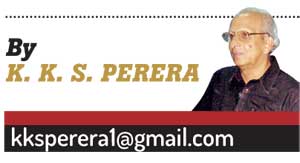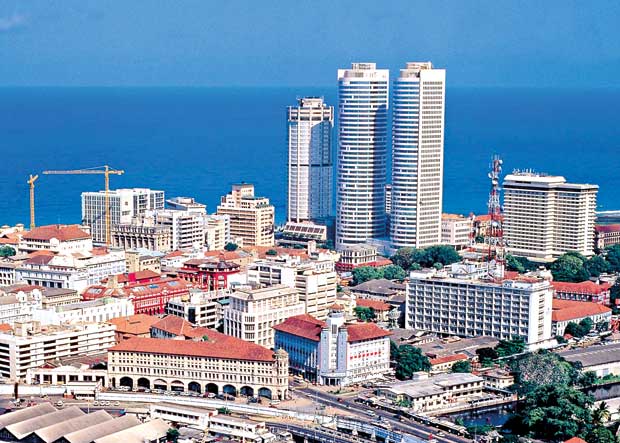Reply To:
Name - Reply Comment
Last Updated : 2024-04-18 17:22:00
 Gafoor Building on Main Street, Colombo in the 1960s
Gafoor Building on Main Street, Colombo in the 1960s
Let me share with your readers some lunch time experiences in the Fort in mid 1960s. In 1967, working as an audit trainee at a reputed firm of Chartered Accountants as a school leaver, I travelled by CTB from Panadura to Fort [there were no private bus operations then] a journey that took only 45 to 50 minutes during the rush hour. Our office was on the third floor of York Street’s Bank of Ceylon building. The passages, corridors and pavements in the Fort were crowded while as for vehicles there were only few cars parked opposite Cargill’s, the country’s number one ‘posh’ shopping arcade in the good old days, that was patronized only by the elite shoppers. Smartly dressed office workers were a common sight in old Colombo. Double Decker buses, Morris Minor taxis and rickshaws
were ubiquitous.
Being assigned for auditing at an Estates Management Company, whose office was located on the first floor at one of the Baillie Street [present Mudalige Mawatha] buildings, we had to walk up and down the place that was notoriously infested with ‘Pubs’. Only one remains now! It was rather untidy, compared to Queen’s, Prince, Lotus, Duke, Bristol, Flagstaff, Church, Galle Buck and Chatham Street of the day, now renamed. Almost all large-scale corporate businesses housed their head offices in the Fort area in the 1960s but many have now either wound up businesses or moved into various other prime new business locations in the outskirts of Fort within the city.
Recently, walking up Baillie St, the present Mudalige Mawatha, after five decades, I nostalgically reminisced, that in 1967 how we enjoyed a sumptuous meal at Colombo Cafe which ran two outlets that operated only during lunch hour, one at York Street and the other at Jafferjee’s building opposite then Times [Present part of customs]. There one could enjoy a good meal of rice and curry for just 90 cents per head! Most bank clerks, who always received special services patronized Colombo Café.
A visit to Walkers office is etched in my memory. The engineering giant’s office was opposite the passenger terminal of the harbour. I was there at the invitation of a Walker’s clerk whom I used to meet at a popular vegetarian café [opposite present State Pharmaceutical Corporation], sharing a thosai diet! Ceylon’s first computer was installed in Walkers office in the year 1966, the seven-piece machine, each of the size of a steel cupboard occupied a large fully air-conditioned floor area, but had a capacity and features of just one-hundredth of a ‘note book’ in the possession of today’s young student! It was two ‘firsts’ in one day––having a glance at a computer and believe me, enjoying the luxury of being inside an air-conditioned office!
On one occasion, a colleague and I had a narrow shave returning after lunch passing the place [a presidential security post is now located there], at Baillie street where the customs ‘boys’ as usual were at a lunch break thamasha singing “Que Sera…sera…,” while we were passing the place leaving for lunch. When we returned after a commotion inside had taken over the merry-makers; an object whizzed missing my colleague’s nose by a whisker right opposite the Globe Bar, which was quite common in those days and the object was a stray projectile.
"A smartly dressed clerk in any one of the foreign banks in Fort in the 1960s enjoyed the same social status as today’s middle level manager in the private sector."
A smartly dressed clerk in any one of the foreign banks in Fort in the 1960s enjoyed the same social status as today’s middle level manager in the private sector. Most of financial institutions like Indian Bank, State Bank of India, Hong Kong and Shanghai, Grindlay’s, Chartered, Mercantile, OTS and National Bank - most are now either closed or amalgamated, were housed in magnificent buildings surrounded by the city’s top three shops, namely, Cargill’s, Millers and Apothecary’s. The second and third closed down a couple of decades ago, while the first is a diversified chain and is still in business. One of the Dutch architectural marvels was the grandeur Chartered
Bank’s building.
The Echelon Square where three five-star hotels, Hilton, Galadari and Kingsbury; the BOC Tower, WTC twins and renovated Dutch hospital now stand and its environment was a neglected plot of overgrown scrubs infested with illicit hooch dens, practitioners of oldest profession, pimps, tipplers, booths collecting racing chits and numerous other eye-sores, catering to port labour over the years. It’s unbelievable that such activities existed in the heart of the Fort.
I had the ‘privilege’ of closely associating with a large work force in the tea blending trade, a good percentage of them coming from the city’s slums when I left Fort in early 1970s to join the multinational, Shaw Wallace and Hedges in Colpetty. These labourers came mainly from Beira banks in Fort, Slave Island and Colpetty. They belonged to minority ethnic groups comprising mainly Keralites, Moors and Malays.
The hundreds of city dwellers lived in Slave Island and Kollupitiya have already been evicted from their modest dwellings they have unlawfully occupied for years on, in order to make way for beautifying and development of the City. During early 1970s, 42% of the city’s population lived in slums and shanties, [the currents figures are not available]. The slum dwellers lived in filthy situations, with piled up trash, sewage run-off. Hundreds of them were ejected from their houses and relocated far away by successive administrations.
Tracing their ‘pedigrees’ I found most of them were either third or fourth generation descendants of migrants from Southern Indian states of Tamil Nadu or Kerala or from remote villages in up-country and Seethawaka, brought into work in Sterling companies by brokers in the latter part of the 19th century, while the Malays had their roots in South Eastern countries, being descendants of World War II soldiers.
"Ceylon’s first computer was installed in Walkers office in the year 1966, the seven-piece machine, each of the size of a steel cupboard occupied a large fully air-conditioned floor area, but had a capacity and features of just one-hundredth of a ‘note book’"
Avoiding an invitation for ‘Daughter attaining age’ or similar occasion which they celebrated in grand was not possible for they looked forward to our presence with great prospect. I yet remember how my colleagues helped me to descend the steep slope of 45 degrees or so, between railway line behind Lake House and Beira, where a row of about 200 shanties were located on the slope itself, and also witnessing rather disgusting scenes of people bathing in the dirty Beira water. A few yards away from bathing spot was a makeshift toilet directly exposed to water, a woman washing clothes and her husband catching ‘Battas’, the dirty looking only variety of fish in Beira, that crowd around the toilets.
Most of the males were engaged in ‘temporary labour’ or in anti-social and criminal activities. The political issue here is nothing but hypocrisy. Slums growing in population help spread HIV/AIDS and breeds the next generation of super viruses or pandemics. The people were packed in like sardines yet remains in many parts of the city. These “unauthorized” constructions are answerable for flooding and the spread of mosquito-borne infections. In reality, many families have lived in their shanties for years—in some cases for generations. Their squalid living conditions are the result of the neglect of successive governments, which have failed to provide basic services, including health care.
 The city of Colombo at present
The city of Colombo at present
Now that the number of city fathers almost doubled a quick solution to the problem could be found. Some of them have a fear that they will not be given alternative accommodation. However, it will not happen. The relocation housing units are being constructed within few metres from where they now live. So, they will not be faced with any problems regarding schooling or travelling to their workplaces. In 1983, the then government cleared a large area in Colombo to build the Sugathadasa Stadium - the country’s largest sports stadium. More than 240 families were evicted and their shanties demolished. The former residents were relocated to what is now known as ‘Stadium Watta’, with no proper infrastructure. Between 1992 and 1994, the government evicted about 1,500 families living on the banks of a canal from Wellawatte to Kirulapona. They were sent to Attidiya - about 10 km away, and each given 50 square metres of land. The first families to be moved had to live in wooden huts. Around 150 families shared two toilets and a single water tap. Years later, in 1990s government laid the foundations for houses and gave each family a loan to build a house. This is the answer for the future in the development of cities. When high rises are built, more space is created. There will be extra housing units to accommodate the many families who are sharing with others. Aid agencies are prepared to fund the housing projects, if this can work out, the problem of slums and shanties in the city could be solved without the government having to put in money.

Add comment
Comments will be edited (grammar, spelling and slang) and authorized at the discretion of Daily Mirror online. The website also has the right not to publish selected comments.
Reply To:
Name - Reply Comment
On March 26, a couple arriving from Thailand was arrested with 88 live animal
According to villagers from Naula-Moragolla out of 105 families 80 can afford
Is the situation in Sri Lanka so grim that locals harbour hope that they coul
A recent post on social media revealed that three purple-faced langurs near t